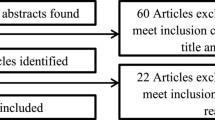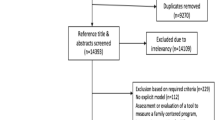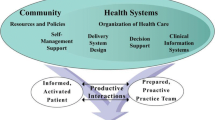Abstract
Maintaining the health of survivors requires communication, collaboration and care coordination between oncology and primary care. Primary care clinicians have been acknowledged as important recipients of survivorship care plans (SCPs); however, current SCP templates have not been evaluated for usefulness in the primary care context. We surveyed and interviewed primary care clinicians from a rural research network regarding SCP content, format and layout (phase 1), and potential use and clinical workflows around SCPs (phase 2). Based on these data, an existing SCP template was iteratively redesigned to better support survivorship care in the primary care setting. A total of 13 clinicians (9 MDs, 4 APPs) participated. Interviewees advocated for maintaining a single SCP document shared by survivors and clinicians. Changes to the SCP template included prioritizing follow-up over summary of treatment and removing or down-playing screening recommendations not impacted by cancer or cancer treatment. The re-engineered SCP was regarded as highly relevant for survivors, but clinicians noted the significant effort to “disassemble” SCPs in order to enter the information into on the receiving health record. Primary care clinicians value the information in SCPs but had important recommendations regarding content, layout, and format. Additionally, a significant effort appears to be required by recipients in order to extract SCP information for future use.


Similar content being viewed by others
References
Miller KD, Siegel RL, Lin CC, Mariotto AB, Kramer JL, Rowland JH, Stein KD, Alteri R, Jemal A (2016) Cancer treatment and survivorship statistics, 2016. CA Cancer J Clin 66:271–289
de Moor JS, Mariotto AB, Parry C, Alfano CM, Padgett L, Kent EE, Forsythe L, Scoppa S, Hachey M, Rowland JH (2013) Cancer survivors in the United States: prevalence across the survivorship trajectory and implications for care. Cancer Epidemiol Biomark Prev 22:561–570
McDonough AL, Rabin J, Horick N et al (2019) Practice, preferences, and practical tips from primary care physicians to improve the care of cancer survivors. J Oncol Pract 15:e600–e606
Klabunde CN, Han PK, Earle CC, Smith T, Ayanian JZ, Lee R, Ambs A, Rowland JH, Potosky AL (2013) Physician roles in the cancer-related follow-up care of cancer survivors. Fam Med 45:463–474
de Rooij BH, Thomas TH, Post KE, Flanagan J, Ezendam NPM, Peppercorn J, Dizon DS (2018) Survivorship care planning in gynecologic oncology-perspectives from patients, caregivers, and health care providers. J Cancer Surviv 12:762–774
Shalom MM, Hahn EE, Casillas J, Ganz PA (2011) Do survivorship care plans make a difference? A primary care provider perspective. J Oncol Pract 7:314–318
Mayer DK, Birken SA, Check DK, Chen RC (2015) Summing it up: an integrative review of studies of cancer survivorship care plans (2006-2013). Cancer 121:978–996
Mayer DK, Nekhlyudov L, Snyder CF, Merrill JK, Wollins DS, Shulman LN (2014) American Society of Clinical Oncology clinical expert statement on cancer survivorship care planning. J Oncol Pract 10:345–351
Tevaarwerk AJ, Klemp JR, van Londen GJ, Hesse BW, Sesto ME (2018) Moving beyond static survivorship care plans: a systems engineering approach to population health management for cancer survivors. Cancer 124:4292–4300
Charlton M, Schlichting J, Chioreso C et al (2015) Challenges of rural cancer care in the United States. Oncology (Williston Park) 29:633–640
DeGuzman P, Colliton K, Nail CJ, Keim-Malpass J (2017) Survivorship care plans: rural, low-income breast cancer survivor perspectives. Clin J Oncol Nurs 21:692–698
Donohue S, Haine JE, Li Z, Feldstein DA, Micek M, Trowbridge ER, Kamnetz SA, Sosman JM, Wilke LG, Sesto ME, Tevaarwerk AJ (2019) Cancer survivorship care plan utilization and impact on clinical decision-making at point-of-care visits with primary care: results from an engineering, primary care, and oncology collaborative for survivorship health. J Cancer Educ 34:252–258
Donohue S, Haine JE, Li Z, Trowbridge ER, Kamnetz SA, Feldstein DA, Sosman JM, Wilke LG, Sesto ME, Tevaarwerk AJ (2019) The impact of a primary care education program regarding cancer survivorship care plans: results from an engineering, primary care, and oncology collaborative for survivorship health. J Cancer Educ 34:154–160
Morken CM, Tevaarwerk AJ, Swiecichowski AK, Haine JE, Williams ZT, Norslien K, Arroyo N, Zhang X, Campbell B, Mendonca EA, Juckett MB, Sesto ME (2019) Survivor and clinician assessment of survivorship care plans for hematopoietic stem cell transplant patients: an engineering, primary care, and oncology collaborative for survivorship health. Biol Blood Marrow Transplant 25:1240–1246
de Rooij BH, Ezendam NP, Nicolaije KA et al (2017) Factors influencing implementation of a survivorship care plan-a quantitative process evaluation of the ROGY Care trial. J Cancer Surviv 11:64–73
Donohue S, Sesto ME, Hahn DL, Buhr KA, Jacobs EA, Sosman JM, Andreason MJ, Wiegmann DA, Tevaarwerk AJ (2015) Evaluating primary care providers' views on survivorship care plans generated by an electronic health record system. J Oncol Pract 11:e329–e335
Tevaarwerk AJ, Wisinski KB, Buhr KA, Njiaju UO, Tun M, Donohue S, Sekhon N, Yen T, Wiegmann DA, Sesto ME (2014) Leveraging electronic health record systems to create and provide electronic cancer survivorship care plans: a pilot study. J Oncol Pract 10:e150–e159
Hua A, Sesto ME, Zhang X et al (2019) Impact of survivorship care plans and planning on breast, colon, and prostate cancer survivors in a community oncology practice. J Cancer Educ
Huenerberg KJ, Anderson BM, Tevaarwerk AJ, Neuman HB, Wilke LG, Seaborne LA, Sesto M (2018) Integrating survivorship care planning in radiation oncology workflow. J Community Support Oncol 16:e66–e71
Stewart TP, Sesto ME, Haine JE, Henningfield MF, Norslien K, Zhang X, Hahn DL, Tevaarwerk AJ (2020) Results of engineering, primary care, oncology collaborative regarding a survey of primary care on a re-engineered survivorship care plan. J Cancer Educ
Health IT and patient safety: building safer systems for better care, The National Academies Press, 2012
Schumacher RM, Lowry SZ: NIST guide to the processes approach for improving the usability of electronic health records, National Institute of Standards and Technology, U.S. Department of Commerce, 2010
Lowry SZ, Quinn MT, Ramaiah R, et al: Technical evaluation, testing, and validation of the usability of electronic health records, National Institute of Standards and Technology, 2012
Reid PPCW, Grossman JH, Fanjiang G (2005) Building a better delivery system: a new engineering/health care partnership. National Academies Press, Washington, D.C.
Health Information Technology: Best Practices Transforming Quality SaEJ, 2013. Retrieved February 27th, 2019 from: healthit.ahrq.gov/portal/server.pt/community/health_it_tools_and_resources/919/workflow_assessment_for_health_it_toolkit/27865
Forsythe LP, Parry C, Alfano CM, Kent EE, Leach CR, Haggstrom DA, Ganz PA, Aziz N, Rowland JH (2013) Use of survivorship care plans in the United States: associations with survivorship care. J Natl Cancer Inst 105:1579–1587
Blanch-Hartigan D, Forsythe LP, Alfano CM, Smith T, Nekhlyudov L, Ganz PA, Rowland JH (2014) Provision and discussion of survivorship care plans among cancer survivors: results of a nationally representative survey of oncologists and primary care physicians. J Clin Oncol 32:1578–1585
Carayon P, Hundt AS, Karsh BT et al (2006) Work system design for patient safety: the SEIPS model. Quality and Safety in Health Care 15:i50–i58
Holden RJ, Carayon P, Gurses AP, Hoonakker P, Hundt AS, Ozok AA, Rivera-Rodriguez AJ (2013) SEIPS 2.0: a human factors framework for studying and improving the work of healthcare professionals and patients. Ergonomics 56:1669–1686
Walker JM, Carayon P (2009) From tasks to processes: the case for changing health information technology to improve health care. Health Aff (Millwood) 28:467–477
Acknowledgements
The authors would like to thank the following: participating providers and members of the Wisconsin Survivorship research Program (WiSP), UWCCC Survivorship Program, and Wisconsin Research and Education Network (WREN).
Previous presentations
None
Funding
This work was supported by the NCI Cancer Center Support Grant P30 CA014520, by the NIH CTSA at UW-Madison grant UL1TR000427, as well as the University of Wisconsin-Madison School of Medicine and Public Health’s Wisconsin Partnership Program, WPP-ICTR grant # 3086.
Author information
Authors and Affiliations
Corresponding author
Ethics declarations
Conflict of Interest
1. Hahn, David — none
2. Haine, James — none
3. Henningfield, Mary F. — none
4. Norslien, Kirsten — none
5. Sesto, Mary E. — none
6. Stietz, Chelsea — none
7. Tevaarwerk, Amye J. — Epic Systems (family member)
8. Zhang, Xiao — none
Additional information
Implications for Cancer Survivors
SCPs can be designed to better support primary care information needs, as can the delivery of information. These likely represent significant barriers to use of SCPs within the primary care setting.
Publisher’s Note
Springer Nature remains neutral with regard to jurisdictional claims in published maps and institutional affiliations.
Rights and permissions
About this article
Cite this article
Tevaarwerk, A.J., Zhang, X., Haine, J. et al. Re-engineering Survivorship Care Plans to Support Primary Care Needs and Workflow: Results From an Engineering, Primary Care and Oncology Collaborative for Survivorship Health (EPOCH). J Canc Educ 37, 1654–1661 (2022). https://doi.org/10.1007/s13187-021-02008-z
Accepted:
Published:
Issue Date:
DOI: https://doi.org/10.1007/s13187-021-02008-z




